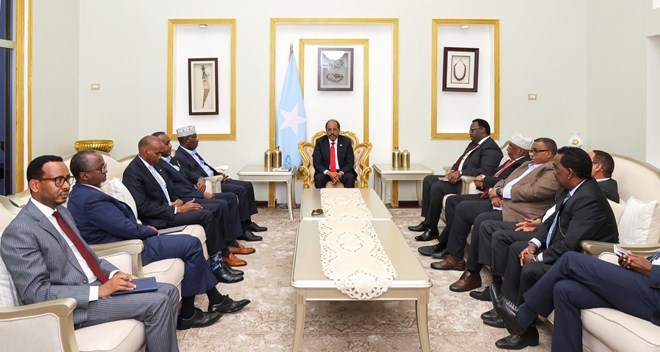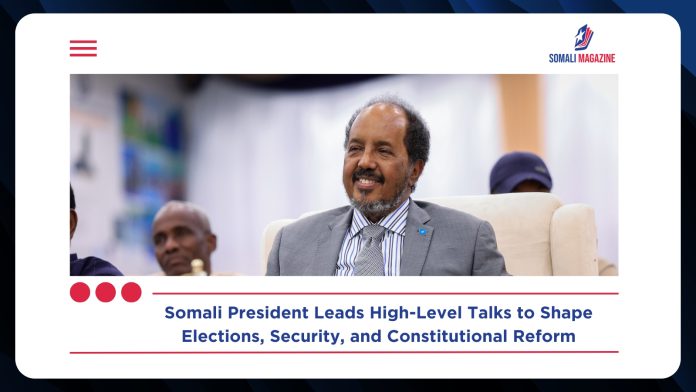Facebook Twitter (X) Instagram Somali Magazine - People's Magazine
The Somali President Hassan Sheikh Mohamud has convened a high-level meeting at Villa Somalia, bringing together former presidents, prime ministers, parliamentary speakers, and other national leaders to chart a unified path forward on elections, national security, and constitutional reform. The gathering, held under the banner of the National Consultation Forum, is being hailed as a critical step in aligning federal and regional priorities ahead of the 2026 elections.
The talks focused on three core pillars: completing the long-delayed constitutional review process, transitioning Somalia to a direct electoral system, and intensifying efforts to defeat terrorism. President Mohamud emphasized the importance of inclusive dialogue and institutional memory, noting that the presence of former leaders reflects a shared commitment to collaborative governance.
“Bringing together former leaders demonstrates our commitment to nation-building based on shared wisdom and experience,” the president said, urging participants to put national interests above political rivalries.
The forum comes at a pivotal moment for Somalia, which is navigating a complex political landscape marked by regional tensions, security threats, and the urgent need for electoral reform. The federal government has pledged to move away from the clan-based indirect voting system and implement a one-person, one-vote model—a shift that requires constitutional clarity and broad consensus.
Security remains a pressing concern, with Al-Shabaab continuing to pose a threat in several regions. The forum reaffirmed support for the Somali National Army and called for coordinated operations between federal and regional forces to dismantle militant networks. Participants also discussed the need for sustainable funding, intelligence sharing, and community engagement to ensure long-term stability.

The constitutional review process, which has stalled multiple times over the past decade, was another focal point. Leaders agreed on the urgency of finalizing the draft constitution to define the roles of federal and regional governments, clarify the electoral framework, and establish a permanent judiciary. The president stressed that a completed constitution is essential for political stability and economic development.
While the forum was widely praised for its inclusivity, notable absences included representatives from Puntland and Jubaland, who have expressed concerns over recent constitutional amendments and federal interference in regional affairs. Their absence underscores the ongoing challenges of federal cohesion and the need for continued dialogue to bridge political divides.
Despite these tensions, the forum concluded with a renewed commitment to national unity and a roadmap for follow-up consultations. The Office of the President confirmed that technical committees will be formed to translate the forum’s resolutions into actionable policies, with timelines for implementation and mechanisms for accountability.
Observers say the forum could mark a turning point in Somalia’s democratic transition if its outcomes are implemented in good faith. International partners, including the United Nations and African Union, have welcomed the initiative and pledged support for Somalia’s reform agenda.
As the country prepares for the 2026 elections, the decisions made at Villa Somalia will likely shape the trajectory of Somalia’s political future. The success of these reforms will depend not only on leadership at the top but also on grassroots engagement, institutional capacity, and sustained political will.

